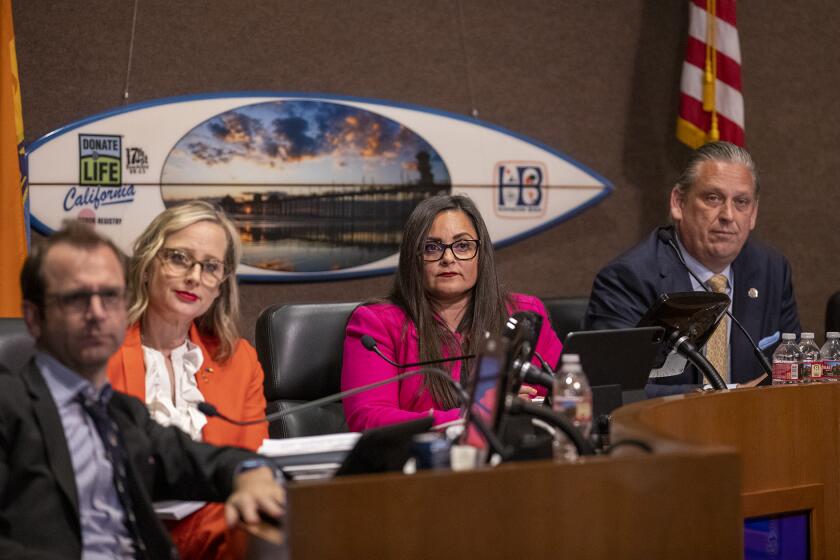Unsheltered, Part 2: Once reluctant, these Orange County cities are opening homeless shelters
- Share via
Editor’s note: This is the second story in a series examining homelessness in Orange County, including the cities of Costa Mesa, Fountain Valley, Huntington Beach, Laguna Beach and Newport Beach.
The chilly winter air rushed in as Mike Brumbaugh opened the door of his patrol vehicle. It was a drab day in late February, but the fog didn’t faze Brumbaugh as he strode toward a man in a wheelchair near a gas station off Harbor Boulevard in Costa Mesa.
“How’s it going, man?” Brumbaugh asked.
As a senior code enforcement officer, Brumbaugh’s job is to respond to complaints or concerns by residents and businesses regarding homelessness. He says his goal isn’t to hassle the homeless people he finds, but to talk to them, get to know them and, hopefully, find a way to help them.
Brumbaugh is part of Costa Mesa’s Network for Homeless Solutions — a coalition of city staff, local churches, nonprofits, private organizations and volunteers created to address homelessness. In other cities in Orange County, similar officers also seek to contact homeless people and connect them with services and other assistance.
“What a lot of people don’t realize is this isn’t just a job,” Brumbaugh said. “It does get emotional sometimes because you get to know people out here, and you know some you can help and some you can’t.”
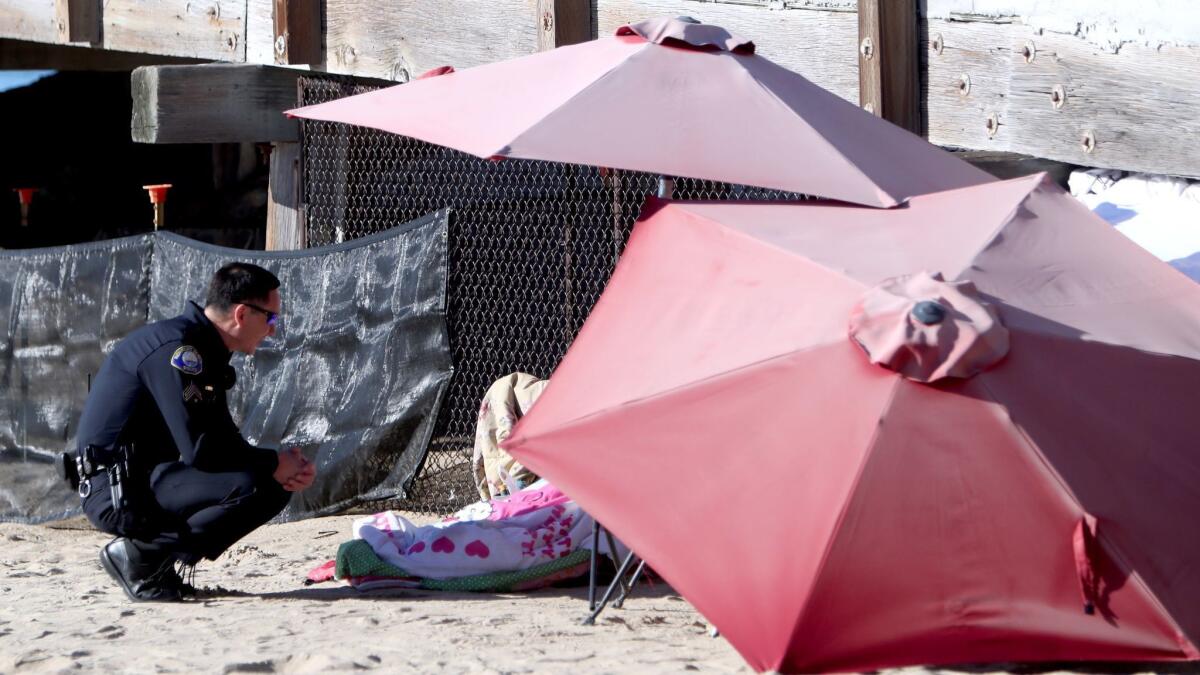
As homelessness in California has exploded, officials across Orange County have wrestled with how best to tackle it. While nonprofits, private sector and faith-based groups have long played important roles, local governments have increasingly found themselves under pressure to do their fair share.
Common responses have included carving out bigger chunks of their budgets for homeless services or adding new homelessness-focused staff positions to their payrolls.
Another popular strategy has been to convene task forces. Costa Mesa created one in 2011, Huntington Beach did the same in 2015 and Newport Beach did in 2019.
Huntington Beach City Councilwoman Kim Carr said Surf City’s task force — consisting of two full-time police officers, one program coordinator and four case managers — has “helped over 262 individuals get off the streets and reunited over 70 individuals with their families.”
“Huntington Beach is committed to being a part of the solution and protecting our residents’ quality of life,” Carr said.
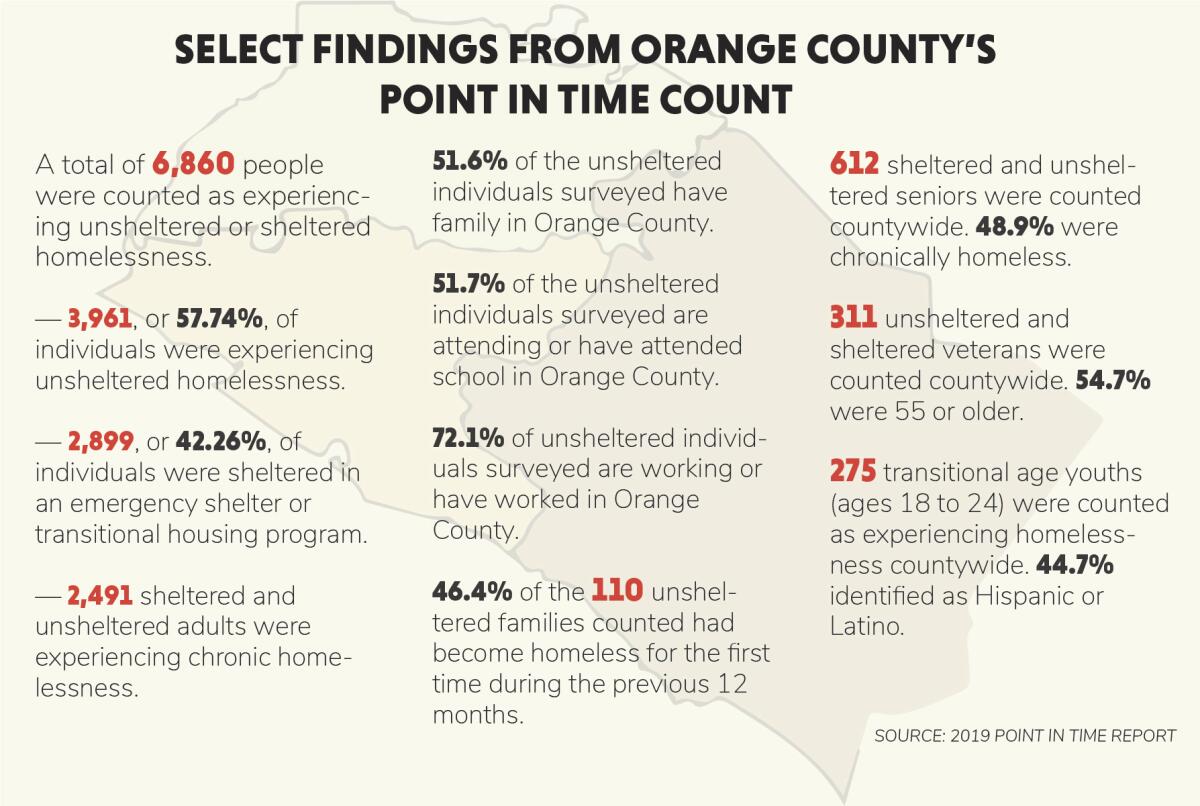
Building shelters
Until recently, however, local governments have been more reluctant to take the more concrete step of opening new homeless shelters.
Laguna Beach was ahead of the curve. It opened the Alternative Sleeping Location in November 2009 on Laguna Canyon Road. It has 40 beds available for homeless people, and five more for the police officers to provide to people in need.
“For years and years, we’ve been the only city in south [Orange] County that has provided a shelter,” said Laguna Beach Mayor Bob Whalen.
The shelter this year began a daytime drop-in program, giving homeless people a place to take a shower, do laundry, send mail, eat, and apply for housing and other social
services.
“We’re proud of what we’ve done in terms of sheltering services.… We think we continue to be a model for that,” Whalen said. “But [we] do look for others to carry their fair share at this point because we feel that we, for years, have probably … been taking more.”
Some cities in the central coastal area of Orange County have started to take action.
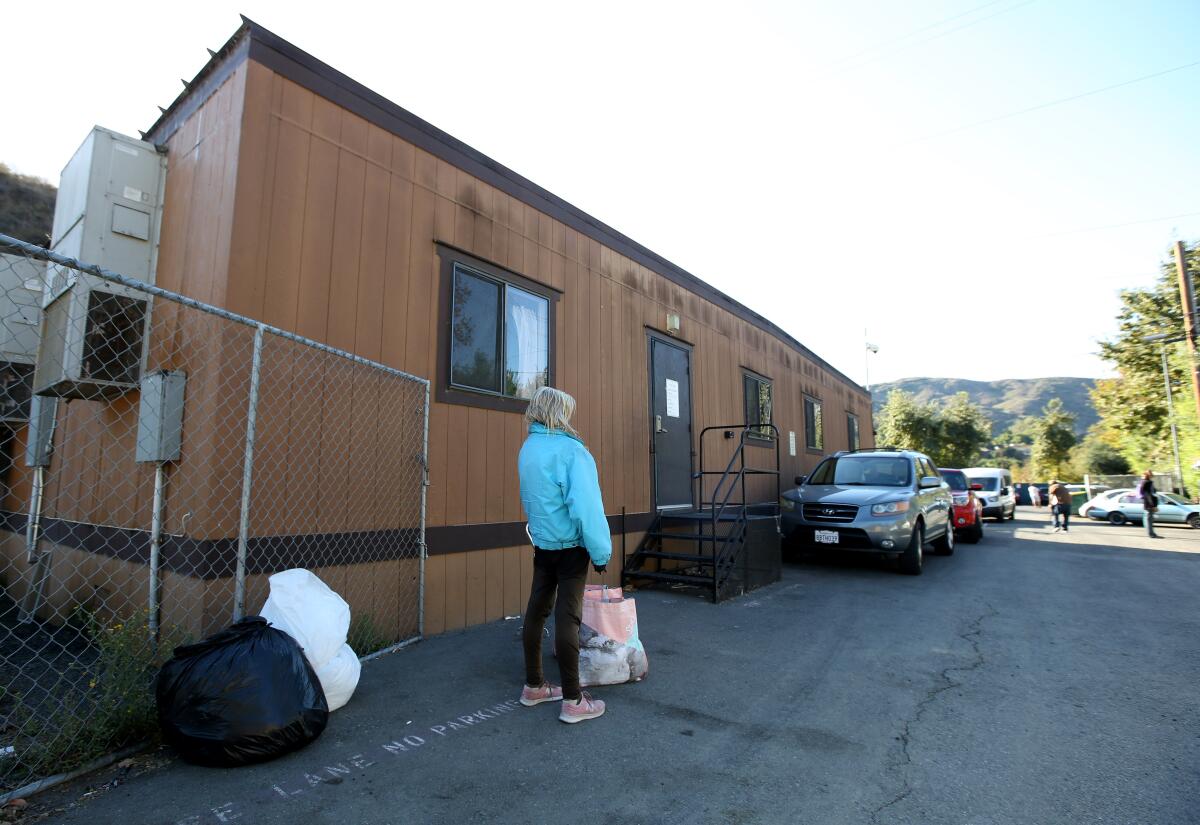
The cities of Costa Mesa, Anaheim and Orange, along with the county, were targeted in a 2018 federal lawsuit, filed on behalf of homeless people cleared from an encampment along the Santa Ana River.
The lawsuit alleged that the cities had effectively forced homeless people to move to the riverbed and that the county’s subsequent decision to clear the encampment that arose there would push them back into the surrounding cities without a plan to provide adequate shelter or housing.
As a primary component of the city’s settlement of the lawsuit, Costa Mesa had to open a shelter. The Costa Mesa City Council agreed in January to move ahead with a 50-bed shelter, to open initially at Lighthouse Church of the Nazarene in the city’s Westside.
Costa Mesa Mayor Pro Tem John Stephens said the legal action played a major role in prodding the city — as did U.S. District Judge David Carter, who oversaw the case.
“He made clear in no uncertain terms … that he would not put up with what he called ‘dumping,’ which is transporting someone who is experiencing homelessness in Costa Mesa or wherever and sending them to another city,” Stephens said. “He changed the way people thought about that issue and he created some jeopardy for anybody who would do that type of activity.”
Throughout hearings and conferences on the lawsuit, Carter pushed the cities to develop more emergency shelters and transitional housing beds. He also toured the river encampment and was on hand when Costa Mesa officially opened its shelter April 5.
“This is an extraordinary journey,” Carter said during the opening ceremony at Lighthouse Church. “It’s a journey that many communities are starting to take.”
Huntington Beach and Newport Beach also have pushed ahead with shelters.
In April, Huntington Beach City Council members approved the purchase of a warehouse with the idea of developing a 75- to 90-bed shelter there. However, those plans hit a roadblock because of a lawsuit filed by residents, property owners and business owners who claimed the site can be used only for industrial purposes.
The city later agreed to sell that property — taking a nearly $80,000 loss in the process — and is continuing to search for a suitable location, possibly a portion of the property in Costa Mesa that is slated for that city’s long-term shelter.
“None of us like the spot that we’re in, but we know that a tough decision is what’s necessary in order to make sure that this doesn’t spiral out of control and we end up looking like the Santa Ana River trail at some point,” Huntington Beach Councilman Patrick Brenden said in April.
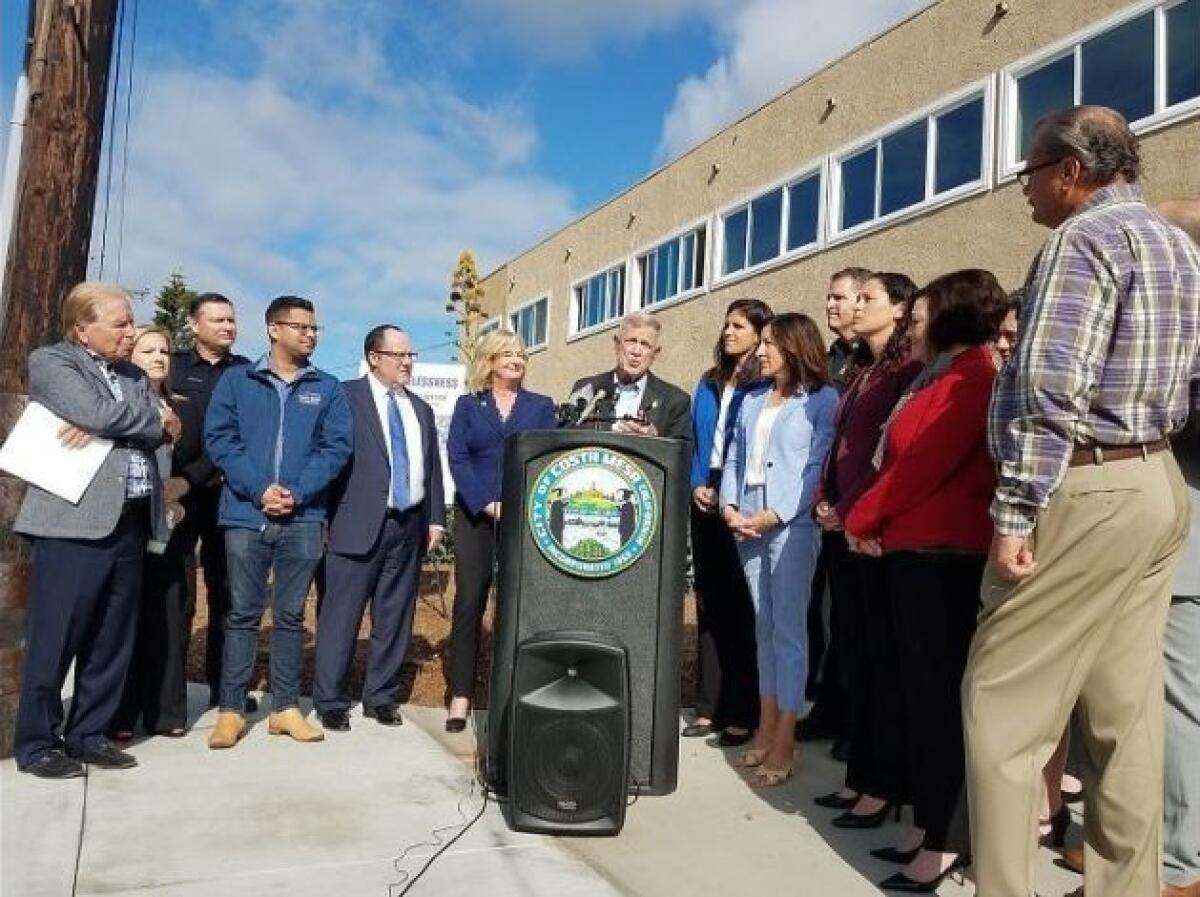
Newport Beach also has been looking at potential shelter sites in recent months. But its planning has been met with threats of legal action from residents.
“We’ve done a lot, but it’s clearly not enough,” Newport Beach Mayor Will O’Neill, who chairs the city’s homelessness task force, said in September. “We need to move quickly, but not so quickly that we make decisions that are bad and stain us for years to come.”
The conversations reflect an evolution in how some local leaders view homelessness — that a city’s responsibility extends beyond its own borders.
“It’s not a victory to move a homeless person from Costa Mesa to Huntington Beach or Huntington Beach to Costa Mesa or from Costa Mesa to Santa Ana or from Santa Ana to Fountain Valley,” Costa Mesa’s Stephens said. “The days of just kind of moving our problem from one city to the other need to be over.”
Becks Heyhoe, director of United to End Homelessness for Orange County United Way, believes the lawsuit over the river encampment sparked a seismic shift in addressing homelessness — in part by putting a dent the county’s reputation for being a wealthy enclave.
“Homelessness wasn’t something [people] thought of when they thought of Orange County,” she said. The legal action, she added, “maybe shattered some illusions that the rest of the country had about life in Orange County.”
The funding problem
Looking ahead, elected officials have emphasized the need for collaboration to build on the efforts of individual cities. However, Helen Cameron, community outreach director at Jamboree Housing Corp., an Irvine-based developer of affordable and supportive housing, had words of caution.
While she said it’s good that cities are looking to open homeless shelters, “you can’t have people living in a shelter all their lives.”
Permanent supportive housing — affordable units that include resources designed to keep people housed and connect them with necessary services — is widely considered to be vital to prepare chronically homeless people for long-term success. An example of that model can be seen in Newport Beach, where the Cove Apartments, a 12-unit complex that serves formerly homeless veterans and low-income senior citizens, opened in 2018.
“Housing creates a stable foundation for work and quality of life,” Cameron said. “A shelter doesn’t provide that environment. A shelter should not be a destination.”
Advocates say development of robust permanent supportive housing should be the next major item on Orange County’s homelessness to-do list. A major obstacle to that is the need for money.
As the Costa Mesa city manager’s office put it: “The primary obstacle to a comprehensive solution is county and state inaction toward providing funding to local jurisdictions that are proactively doing their fair share to protect vulnerable individuals and better the public health of their communities. The governor and the county must collaborate with local cities to ensure funding flows to cities that proactively shelter and house homeless individuals.”
Last year’s state budget included hundreds of millions of dollars for homelessness-related programs in large cities and counties.
“Cities can’t do it alone,” Gov. Gavin Newsom said in a budget-signing video in June. “As a former mayor, I was always looking for state support, looking for more federal support. But this state is now stepping up and recognizing that we need to be part of that solution.”
“It’s not a victory to move a homeless person from Costa Mesa to Huntington Beach or Huntington Beach to Costa Mesa or from Costa Mesa to Santa Ana or from Santa Ana to Fountain Valley. The days of just kind of moving our problem from one city to the other need to be over.”
— John Stephens, Costa Mesa mayor pro tem
Nearly $3 million also is being directed to the Orange County United Way’s United to End Homelessness Welcome Home OC program. That effort provides rental assistance vouchers to help homeless veterans secure private apartments.
“I am committed to working with Orange County United Way and our collaborative partners to get every veteran into housing as soon as possible,” said Assemblywoman Cottie Petrie-Norris (D-Laguna Beach), who secured the funding. “Thanks to our community’s strong commitment and support, Orange County is poised to become the second county in California to end veteran homelessness.”
Another effort is the Orange County Housing Finance Trust, formed in 2019 as joint authority for cities and the county to secure and allocate funding for housing.
Dawn Price, executive director of Friendship Shelter, the nonprofit that operates the shelter in Laguna Beach, said, “We have had a lot of problem-solving this year.… Regionally, communities have stepped up and established shelters.”
But, she said, “housing is really the key.”
“We don’t think our way out of this problem,” Price said. “We don’t organize our way out of this problem. We certainly don’t argue our way out of this problem. The problem is homelessness and the answer is housing. It really is that simple.”
Coming in Part 3: What are the obstacles on the road ahead?
Daily Pilot staff writers Lilly Nguyen and Julia Sclafani contributed to this report. Priscella Vega writes for the Los Angeles Times.
Support our coverage by becoming a digital subscriber.
More to Read
Sign up for Essential California
The most important California stories and recommendations in your inbox every morning.
You may occasionally receive promotional content from the Los Angeles Times.









